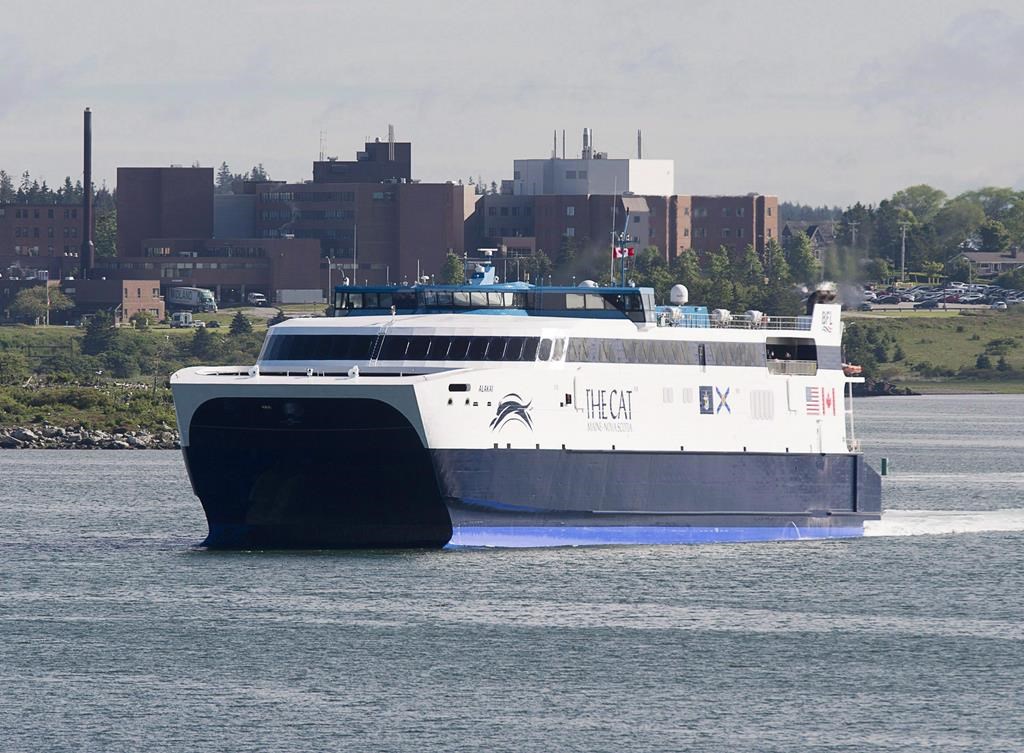The private operator of a Nova Scotia-Maine ferry has begun demolition work on a terminal in Bar Harbor, Maine as they race against time to prepare what they hope will be the service’s new American port-of-call.

The demolition of the terminal was first reported by Bangor Daily News.
Mark MacDonald, CEO of Bay Ferries Ltd., said in an email Tuesday that the company has begun demolition on the outbuildings of the terminal that would house the ferry, better known as the CAT.
“There are significant renovations to the interior of the main terminal building, to the external yard/customs plaza area and to the pier,” said MacDonald, detailing the US$3 million in upgrades needed to bring the terminal up to code.
READ MORE: Nova Scotia ferry’s port switch in Maine held up by U.S. government shutdown, new governor
Bay Ferries has been attempting to move their American port from Portland, Maine to Bar Harbor, Maine since at least March 2018.
The company has successfully negotiated a five-year lease agreement with the Town of Bar Harbor but key components remain unsigned: Maine still owns the terminal and Bay Ferries has yet to reach a deal with U.S. Customs and Border Protection (CBP) that would see the company shoulder costs associated with the agency operating out of the terminal.
Although Maine has agreed to sell the terminal for approximately US$3.5 million to Bar Harbor, the deal has yet to close.

Get daily National news
The decision has been endorsed by Bar Harbor citizens in June and approved by the town council in October but the transition to a new governor has left the town waiting for state officials to sign off on the transfer of the terminal property.
The deal was originally supposed to close on Nov. 30, 2018 but Cornell Knight, the town manager, said they still expect to be able to close the purchase “on the property by the 31st.”
Under the town’s five-year agreement with Bay Ferries, Bar Harbor is set to get a minimum $200,000 a year in revenues based on passengers and the amount of bus traffic carried by the CAT.
WATCH: Nova Scotia ponders paying for U.S. border agents

However, an even larger issue is out of Bay Ferries and Bar Harbor’s control.
The planned arrival of the CAT service in Bar Harbor means CBP would need to provide service 120 days a year and hire an additional five to seven officers to operate the newly refurbished international ferry terminal, which would be up to CBP standards.
As a result, the customs agency is asking Bay Ferries to enter into an agreement that would see them foot the bill for refurbishing the terminal as well as the salaries of the new employees.
But the prolonged partial shutdown of the federal government in the United States prevents officials from both groups from contacting the CBP personnel needed to strike a deal.
Mark MacDonald doesn’t think reaching a deal will be an issue, saying his company had “quite extensive discussions” with CBP about the terminal’s layout.
“Final approvals will be necessary after the government shutdown ends,” MacDonald wrote.
CBP has previously expressed concern over Bay Ferries’ ability to get the upgrades done in time for the 2019 sailing season — slated to begin in June.
READ MORE: Nova Scotia refuses to release management fees for CAT ferry
Nova Scotia and Bay Ferries have had a close relationship after the province inked a 10-year deal with the company to operate the ferry service between Yarmouth, N.S., and Portland, Maine, back in 2016.
Although Bay Ferries operates independently, it receives an annual operating subsidy of approximately $10 million from the province of Nova Scotia.
The provincial subsidy for the 2018 sailing season was projected to be $10.9 million.
Provincial taxpayers, however, will contribute additional funds for the move to Bar Harbor.
As Global News reported in October, the province has made a series of million-dollar commitments associated with the move.
The commitments include a US$1-million guarantee of Bay Ferries’ five-year lease of the Bar Harbor ferry terminal and the previously mentioned US$3 million in upgrades and improvements at the terminal.








Comments